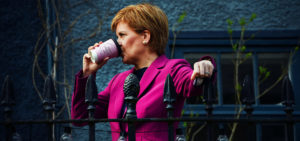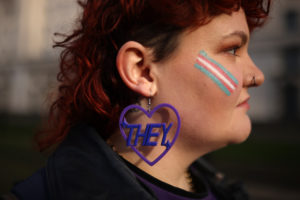Lent began this week with a rehearsal for a crucifixion. On Tuesday, SNP leader hopeful and devout Presbyterian Kate Forbes was faced with something she must have known was coming: a challenge from journalists about her views on gay marriage, womanhood, and children being born out of wedlock. She did not flinch from spelling out what she thought. By Ash Wednesday, several of her backers within the SNP had publicly recanted, running scared from the ensuing furore, and Forbes was said to be taking “a break from media commitments”.
Accompanying Forbes’s profession of faith was an apparently sincere endorsement of existing equality law, reiterated on Twitter since. But this complication has been widely ignored in the denunciations that followed. Perhaps unaccustomed to the sight of a principled act of conscience from a Scottish politician, our modern-day Pharisees — otherwise known as newspaper columnists — swung into action to make sure it would not happen again.
As is their wont, several commentators pretended to be taking the room’s temperature while actually turning up the thermostat. In The Times, Alice Thomson warned that if Forbes “can’t step back from the pulpit, she’s in danger of becoming as polarising as Sturgeon”. Another Times correspondent declared that Forbes was now “fighting for her political career, not just the leadership” — as if there were no room in serious politics at all for someone with Forbes’s views.
The Guardian was yet more forthright. “Pass the idiot pills!” hooted John Crace, punning that the politician was on “a mission” (geddit) “to torpedo her own career”. Over in the New Statesman, progressive clergyman Michael Coren blathered that Forbes shouldn’t “receive a free pass” on her views “because they’re allegedly a product of her faith” — the “allegedly” vaguely implying that her membership of the Free Church of Scotland could be a front for something even worse.
Forbes has found her defenders, too: most notably, Kemi Badenoch, who referred to her duty as Equalities minister to protect religious freedom, arguing that Forbes should be allowed to have “freedom of conscience”. As strategic as this defence from Badenoch is, though, I don’t think it quite works. Individual citizens of course have the right to freedom of conscience — including Forbes, who should be able to think and say whatever she likes within reason. The more pertinent question, though, is whether the religious or philosophical beliefs of a politician are relevant to their suitability for office, and especially when the office in question is leader.
Generally speaking, I don’t see why they aren’t — quite the contrary. The farming industry might reasonably be concerned if a vegan became Secretary of State at Defra. The Equality Act protects the philosophical beliefs of spiritualist psychics, but if a would-be prime minister claimed he could see into the future, voters might worry. And in both cases, the assurance that the beliefs in question were “personal” wouldn’t be much consolation — after all, they are still beliefs, involving a distinctive way of looking at the world that by definition can’t be switched off at will. Where a person appears to be able to leave his personal beliefs at home — as Forbes’ rival Humza Yousaf implies he can with Islam — then arguably, he doesn’t have very strong beliefs in the first place.
Equally, sometimes the personal beliefs of a politician can make them look a lot more attractive to voters. Speaking for myself, I think it’s a promising sign that Forbes is willing to say that the rapist Isla Bryson is a man. It makes her look a whole lot saner in that respect than many of her SNP colleagues. But if that’s the case, it can hardly be a problem in itself that, for others, the very same belief makes her seem like a liability. If legislation in a particular area is still a live question and stands a chance of being influenced by the views of a party leader — as is certainly the case for gender reform law in Scotland — then it’s reasonable to place any would-be leader’s background religious or philosophical beliefs about it under the microscope.
The reason it’s hard for anyone on the rational side of identity politics to admit all this, I suspect, is that many of those objecting vociferously to Forbes are clearly doing it for self-serving reasons. Perhaps refreshingly in Scottish politics, for once their objections are not really about gender-critical beliefs in particular, in any substantive sense — for if they were, fellow gender-critical candidate Ash Regan presumably would be getting the same sort of treatment. And nor is the fuss about conservative religious belief in Scottish politics, generally — for if it were, then Humza Yousaf should be getting flak too.
Nothing as rational as that is going on here. Rather, Forbes’s words have been seized upon because they help prop up adherence to a different sort of modern dogma: the rainbow religion promulgated in the name of the amorphous “LGBTQI+” people. Like Christianity, this centres on the figure of a sacred, innocent outsider, beset on all sides by hatred but turning the other cheek, and freeing people from their traditional ways of life by lived example.
Alongside the idea that you can reinvent yourself at any time, it’s one of the fundamental tenets of this value system that LGBTQI+ people are still actively persecuted across the board in modern Britain, with no room for further nuance about who exactly, or under what circumstances, or what the hell some of those letters even stand for anyway. Hundreds of public and third-sector organisations and enterprises are invested in this exceptionally simple story. Indeed, some of them make a lot of money from it. Thousands of employee hours have been spent in HR training sessions, listening to ropey statistics that represent perceptions of persecution among gay and trans people as fact. At this stage, there is such collective national investment in thinking of LGBTQI+ people as severely oppressed that one obscurely fears a lightning strike even to raise a question about it.
But there is also a problem here. To sell a good story about victimhood, you need a convincing-looking persecutor with sufficient power, and yet it’s increasingly hard to find a credible one. One problem is the increasing tolerance of UK society — including in Scotland where, in 2017, 69% of people polled said that same-sex relationships were “rarely wrong” or “not wrong at all”. While widespread in the past, genuine homophobia seems to be on the wane in the UK, which is presumably why Stonewall has recently had to extend its concept of “hate crime” to things like accurately identifying human biology or making jokes about asexual people. Another problem is that, in those sections of society where antipathy to gay and trans people is apparently higher than the national average — for instance, some immigrant or working-class ones — the additional factors of class, race, and nationality make it politically inexpedient for progressives to mention the fact.
None of those complications applies to Kate Forbes, though, which makes her a much more suitable baddie for activist purposes. Never mind that she also says you can “do what you want” in a free society, or that Scotland is mostly secular, or that there is currently no political will whatsoever to roll back gay marriage there (even if she personally wanted to, which she says she does not). The main thing is that she is white, Cambridge-educated, and Christian, and for bonus points a follower of an obscure Calvinist denomination historically associated with such killjoy practices as tying up children’s swings on a Sunday. And she refuses to toe the rainbow line. Even better, she’s a woman — so much easier to project intolerance and unkindness upon her, relative to the presumed baseline for her sex. By appealing to such gross characteristics, she nicely fits — more or less, if you squint a bit — into a fantasy of persecution that helps keep the whole show on the road for another year.
Of course, in practice, no-one criticising her has any idea whether Forbes is a genuine homophobe or not. Another facile equation made by those religiously invested in victimhood for LGBTQI+ people is that any objection to liberalisation must be rooted in some kind of “phobia”. In practice, like everyone else, Christians range from kind, tolerant, and generous people to bigoted nutcases, with many shades of grey in between.
But Forbes is unlikely to be given the benefit of the doubt. To do so would be to squander a rare chance to perpetuate the hysterical fantasy that LGBTQI+ people in Britain, generally, are permanently a hair’s breadth away from malicious destruction — even as the Equality Act explicitly protects both gay and trans people, the BBC hosts dozens of positive stories about trans youth, millions of pounds roll into charity coffers, gay men rule entertainment telly, lesbians rule women’s sport, and entire classrooms change their pronouns to the delight of their teachers.
As I say, what we have here is a clash of two religions. One of them is full of sanctimonious, swivel-eyed moral scolds, rooting out heresy and trying to indoctrinate everybody into their fantastic way of thinking. The other is a branch of Calvinism. One of them asks “what would Jesus do?” and the other “what would Owen Jones think?”. Faced with a choice between their representatives on earth, I know which kind I would prefer to see in high office.
Disclaimer
Some of the posts we share are controversial and we do not necessarily agree with them in the whole extend. Sometimes we agree with the content or part of it but we do not agree with the narration or language. Nevertheless we find them somehow interesting, valuable and/or informative or we share them, because we strongly believe in freedom of speech, free press and journalism. We strongly encourage you to have a critical approach to all the content, do your own research and analysis to build your own opinion.
We would be glad to have your feedback.
Source: UnHerd Read the original article here: https://unherd.com/




